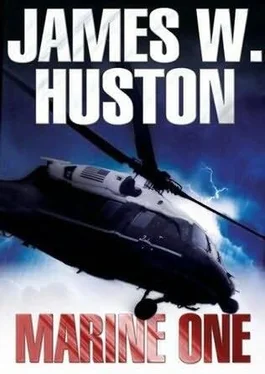"Look, before we get all the way through this trial and send this case to the jury, we wanted to call and see if you've come to your senses yet and are prepared to discuss settlement."
"My senses? I made a settlement demand to you a long time ago, and I am not about to discuss settlement over the phone. But if you and Kathryn come over here right now, we can discuss our positions and see if there is any point in negotiations. But you must be here within fifteen minutes. I have work to do and a case to try."
I glanced at Kathryn, who shrugged, then nodded reluctantly. "We'll be right there."
I drove Kathryn to the hotel. Neither of us said a word. We parked in the hotel parking lot, went in through the lobby, and back to the ballroom, where I had attended numerous bar receptions and balls. A security guard standing at the door recognized us and opened the door. When we walked into the room, I was stunned. It was the most impressive high-tech legal setup I had ever seen. Desks with oversize flat-screen monitors were everywhere. A big-screen TV in the middle in the back-had to be seventy-two inches-had been split into four quadrants to see four networks that were following the trial, including Court TV, CNN, MSNBC, and FOX. They were all giving it essentially twenty-four-hour coverage. Hackett undoubtedly had a PR person feeding the media theories and information all the time. That person was probably sitting in the ballroom as we entered.
A huge white screen on the right side with an ELMO set up was probably used to practice the use of the trial exhibits to make sure they projected well across a large room like the courtroom. A PowerPoint projector sat next to the ELMO and a DVD player. In this mini-court, Hackett and others could practice witness examination and evidence presentation. All his associates and paralegals had their own desks and computers and were busily working. In the middle was a square conference table with six chairs set up around it. We stood there waiting for someone to recognize us. Finally, Greg Bass came over and greeted us. He pointed us to the conference table. We walked to it and stood by it. Presently, Hackett came out from behind a large black curtain or screen that I had not previously noticed but which undoubtedly constituted his office. The aluminum framing had high-quality black curtains that set up a square-walled office that took up an eighth of the ballroom in the corner. Bright lights could be seen shining from behind the curtain. Hackett had his coat off and his tie loosened. He looked more fit than I thought he was. He walked over to the conference table and extended his hand to Kathryn. "Good evening, Ms. Galbraith. I'm glad you could come over."
She shook his hand. "My pleasure."
He turned to me and shook my hand. "Mike, good to see you."
"Evening."
"Please, sit down," he said. "Would you like some coffee or tea?"
Kathryn and I both shook our heads.
"All right, then let's get down to business. You called me about settlement. What do you have in mind?"
Kathryn glanced at me, leaned forward on the table with her hands folded, and said, "We're not stupid. I realize that so far the evidence has not gone our way."
Hackett tried not to smile.
"We think that will change when it's our turn to put on evidence, but even if it doesn't, the value of your cases will not change. I'm prepared to offer you the full policy limits for settling all the cases. Two hundred fifty million dollars."
Hackett shook his head slowly. "That's a quarter of my demand before I filed, before discovery. This accident was your client's fault. That's just as clear as it could be now. The value of the cases hasn't gone down . You just heard my economist testify about what President Adams would have earned after his second term. This was not a president who was going to sit around as a former president and play golf or build rocking chairs. If he gave a speech every night, he could earn a million a week!" Hackett leaned forward for emphasis. "He was going to change the way former presidents lived. He was going to contribute to the economy and become a CEO of a major corporation. Kathryn, did you not hear what my economist said? Think Exxon. You know how much the CEO of Exxon made last year?" Hackett continued without hesitating, "Well, I'll tell you. He made three point six in salary, three point nine in bonuses, and twenty-eight in stock awards. That's in millions, by the way. That's a total of thirty-five and a half million dollars for one year. You think maybe President Adams wouldn't have done a stinky oil company? How about Wal-Mart then. Thirteen point one million dollars. You think maybe a bank? Citigroup perhaps? Try thirty-three million dollars. Maybe he'd run a hedge fund in New York. Some of those guys pull down five hundred million dollars a year. Maybe something more family-friendly? Mouse Ears, say? Eight million. You want to know what a former president will make? Well, how about Clinton? While his wife was running in the Democratic primaries, she disclosed their tax returns. Seven years, one hundred nine million dollars-and not much of that is from her Senate salary. So that's not too bad. I think you get the idea. Multiply any of those by his remaining work life, and you get the idea of why my settlement demand is going nowhere but up.
"Then you have the great American hero, the Marine pilot of Marine One, who was shot in the jaw in Iraq and came back to fly the president around. You've got your crack attorney here accusing him of being a homosexual or something-"
"I said nothing of the kind."
"Yeah? Well, you sure implied there was something mischievous or unhealthy about their relationship. So on the one hand you've got President Adams, who was going to set a new world record for earnings after leaving the presidency, and you've got the most sympathetic plaintiffs in the history of American civil litigation. So two hundred and fifty million dollars is a joke , Kathryn. We'll get six hundred million dollars in economic damages, minimum. Then the jury will double it for general damages, loss of companionship, society, and consortium. That's one point two billion. And then we'll go back and ask them for punitives. My prediction is they'll award twice what they already did, for another two point four billion, a total of three point six billion. I could be wrong. They might use a multiplier of, say, ten, and award twenty-four billion for punitive damages. This jury is just waiting to punish this evil foreign corporation that killed their president. As you both know, under Campbell vs. State Farm , the Supreme Court believes the multiplier of actual damages to punitives must be less than ten in order to comply with constitutional due process. Okay. I'll give you six-even though I'm going to ask for more than that from the jury at the end of this trial. Six times three point six is twenty-one point six billion dollars. So you want my demand? My demand to settle this case tonight-for all plaintiffs-twenty billion dollars."
Kathryn was stunned. "You're out of your mind."
"Really? Who's been right so far, Kathryn? You could have resolved the case before it got filed. Your policy, a bunch thrown in by WorldCopter-which seems only fair-and it would have been done. But as usual, you weren't thinking big enough. You thought this would be some ten-million-dollar case and didn't take my demand seriously. Fine!" Hackett threw his hands up. "You don't have to. But don't come crying to me now saying I'm being unreasonable. You had your chance."
I was furious. He was toying with us, trying to humiliate us. I felt uncontrollable anger welling up, which if left unchecked would result in my punching him in the face. I looked over his head at the curtain behind him to avoid looking at his smug expression.
Читать дальше












